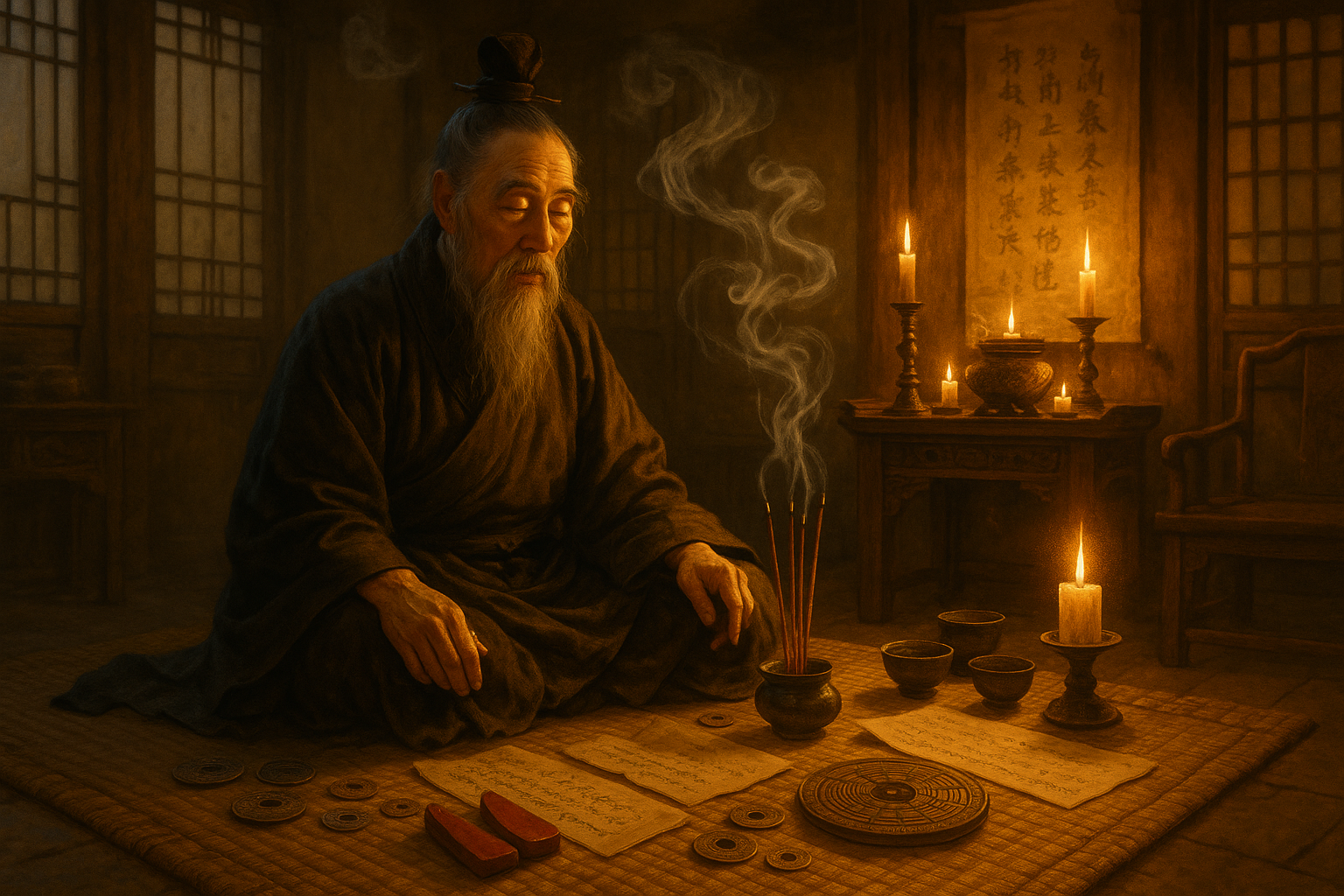
Sacrifice rituals, Jaai Ji 祭祀 (Saamlawnese: Ji Ju), is a ritual done for worshipping. However, what is this all about and how does it work? After reading the eye-opening and mind-blowing article on “What is God” and “Worshiping,” this is the next one that will bring you more clarity. If you have not read those articles yet, please do so before digging deeper because this article is episode 3 of the same series!
The common impression of the sacrifice ritual is to offer food on the table, with candles and incense, then pray to the gods and say that these are for them, and beg the gods to give blessings for the XYZ event. You can see this kind of practice in many Asian businesses, such as the filming industry. They would do this kind of ritual before the project began, often combining it with a lion dance and all sorts of “auspicious” performances. However, I can tell you that most people don’t understand what is happening and do the ritual because it is a part of the culture. If you are curious about how things work and how they work, you have come to the right article for the answers. After reading the previous two articles, your mind should be blown already, but we will blow it again with this one. Prepare and put on your seat belt in case you get blown too hard.
Before we go further, let’s recap a bit from the previous article. Worshiping is investing your heart into someone or a god in the form of faith and delivered by a physical method. It could be expressed by a bow, kneeling, or doing other things like a sacrificing ritual.
How Does Sacrificing Work
Sacrificing means you are giving what you could have to someone. For example, I could have two hours of free time today, yet I sacrificed it for you by talking to you on the phone and doing what you wanted. The sacrifice is made for you; I am giving you my time.
In ancient times, people would raise a pig, a cow, or sheep and use them as food later. These are precious things for them. A chicken can keep giving them eggs and be their morning alarm clock. As you can see, for farmers and villagers, animals are a big deal in their life. If they want to sacrifice these animals to the gods, they give the gods what they could have as food to show their faith! The people loved and wanted to have these things, but they chose not to have them and sacrifice them for the gods. The gods would feel the heart from what is put on the table. The god said, “Wow, that’s like your two weeks of food already; you have much faith in me!”
Sacrificing for the master is done in traditional relationships when one enters a sect to learn. It could be a martial art, medicine, Taoism, or anything. Every once in a while, the disciple would give the master some money which they could have kept for themselves. It’s not for “paying the master for teachings” but as a gift. This is done as a sacrifice to show their respect and filial piety toward the master. Modern society doesn’t do this much, but some outstanding disciples of mine still know to do it! It means that the disciple is giving the master their heart, showing how faithful they are. They could have kept all that money for themselves, enjoyed some good food, or bought a new gadget. Yet they gave it to the master because they believed that the master would give them something better: guidance, knowledge, teachings, love and care. The master who received these sacrifices would feel they must do better and better as a master, giving these disciples more than he could give. (At least that is how I feel!)
For the people who live in the city nowadays, a chicken, a fish or even some beef is not that big deal. Just go to the supermarket and buy it, then it’s there. Compared to the people in ancient times, they had to use a lot of time and energy to raise the animals; meat is precious and hard-earned! The meaning of the meat on the altar table is completely different already. That is why sacrificing rituals nowadays are fake and useless because people don’t even feel they are giving something precious anymore. It’s like buying groceries and giving some to the gods (while you can eat it later).
Sacrificing in Daily Life
In marriages, husband and wife cannot be on their honeymoon forever, and no one will kiss-kiss and hug-hug all their life. Normal life will kick in, which is the mature part of a marriage. We are all different; no one would have the same interest and minds; husband and wife could often have different interests or things they want to do. A good husband or wife would sacrifice their time for the other side, doing what the other side loves and enjoying the time with them. For example, the wife loves to be massaged, and the husband is a nerd who likes to read books. He would spare an hour daily to massage his wife instead of using it to read books. Even if he were in his most exciting chapter, he would stop what he was doing and go massage his wife. This is a form of sacrifice. The wife could feel it and appreciate it.
I am playing a game requiring a second player to “donate” some troops to me for the attacks I am doing. One of my disciples decided to stay up and not go to sleep early but to donate troop to me for the two hours of gaming time. She could have just gone to sleep; it was a form of sacrifice too.
Sometimes grannies are “boring” and might enjoy something you don’t. For example, your grannies love watching old TV shows that you don’t care about. As a good grandson, you would stay in the living room and watch the show with them for an hour or so while enjoying it and not showing them a bored face. Grannies might tell you to go to sleep or do your own thing, and you would say, “No, I will stay because I want to just spend some time with you” your grannies would feel it in the heart right away and be touched. They knew this was not your type of show and that you were doing it to show your heart to them.
We might sacrifice for the house too! Cleaning the house, doing a renovation, and decorating the place is all a form of sacrifice of time, energy and passion toward the house. As a result, the house will return you with good energies that improve your quality of life, which is a natural way of working with Fung Shui energies. You might say that everyone cleans their house too, how come they don’t get any improvement in their life from doing so? As you might have noticed, it takes the right mindset, time, energy and passion for a true sacrifice to work. If you are cleaning the house and feel it is a chore, or you hate to clean it, but you have no choice, then you are not sacrificing already. Where is the love for your house?
Please note that sacrifice is about doing something that makes the other side happy. Please don’t put on blackface and look so unwilling while doing it. The goal is to show your faith, but for the other side to accept it, they must be happy and feel touched! If your action doesn’t do the job, it’s not a successful sacrifice.
Sacrificing in Taoism
As a committed and faithful Taoist, I have set time for daily cultivation, such as chanting and doing rituals at the altar. I would spend an hour or more chanting at the altar in the morning. I wake up at 5 am daily to do this on time and never miss a session; it was my sacrifice for the Tao. I don’t have a fixed schedule because I run my own business, and no one will scream at me for waking up late. I could have slept until 10 am and not had to wake up in the bitterly cold morning. Some teenagers would love to sleep until a time they wake up naturally! However, I decided to sacrifice my time and do something for the Tao to cultivate and do the morning rite, which shows my faith and love for the Tao.
Some disciples also tried to do the same thing as me, but they woke up with a tired face, unmotivated, and yawning in front of the gods, feeling bored, and forced to chant. Their chanting sounds horrible, which they don’t care to improve. To them, it is all about doing the ritual and completing it. It’s like a mechanical action with no feelings or passion. I wondered how the god would feel about this “sacrifice.” If I were the god, I would rather not look at them and tell them to sleep. It’s so disgusting and hard to watch. They don’t understand the true meaning of sacrifice, and they don’t have faith inside when doing the ritual. They thought I was forcing them to wake up early and make them “practice” the chanting before the altar, like a punishment. Too bad these disciples did not appreciate the teachings and opportunities while they could build a better relationship with the gods. Maybe they were just like when I was young; naive and ignorant. I hope this article will educate my disciples enough to avoid that kind of situation in the future.
Food sacrifice is only one of the many ways to show your faith. It is a tradition to put food on the table and offer it to the gods to show your heart. However, there is a big difference between “food offerings” and “food sacrifice.” As we have explained earlier, food sacrifice is made to give something very precious to you for the gods; food offerings are about giving food to show appreciation and thanking the gods, which doesn’t need to be very precious.
There are other forms of sacrificing, such as dancing, singing, burning some art you have been working on for hours, or even doing a performance you have been practicing and polishing. It’s all about your time, energy and passion being compressed into a form to be delivered to the other side, which we call a ritual.
The Ritual
The word we are talking about in this article is 祭祀 which is sacrifice and ritual. However, the word ritual is not accurately describing the word in Chinese.
This word for ritual means to “align the focus and direct the heart to a certain direction.” Simply said, what is the sacrifice for? The purpose of making this sacrifice. For example, you sacrifice the time to massage your wife for her to love you more. You can sacrifice something for god to grant you magical powers. You can also sacrifice something for god to give blessings. People in ancient times sacrificed for the god to help them win a battle (by giving them the power to fight).
For our daily rites that we do at the altar, the chanting and such, are done as a sacrifice to show the gods our faith as a Taoist, for the goal of being able to cultivate enough to ascend to our Taoist heaven, Daai Law Tin after we die. We make many sacrifices for this same purpose because it is our most important goal!
Every lunar 1st and 15th, we also do a ritual as a sacrifice. We would sacrifice our time and energy to do the ritual, invoke the gods in our homes, and witness our faith. In return, the gods will give us blessings and magical powers that we can use with our Taoist magic. No matter how busy you might be, you would sacrifice the time to do the ritual on the exact date and commit to it. Not everyone can do this because they would say they are tired after work or busy with this and that. Making time for god is not easy, and that is what makes us faithful Taoists.
You can also read about our god Woh Sing Deity, a god related to our Tao-Game cultivation. Playing a game that the god has chosen is a form of sacrifice too. The game requires time to play, learn and get good at, which will all contribute to the result, such as winning wars for the Tao. Some disciples said they didn’t like this type of game, but so what? Remember the example of watching TV with your grannies? It’s what they like, not what you like. You should learn to love it with them, sacrificing your time, energy and passion! Some disciples would say they had never played this kind of game before, but so what? You are making a sacrifice, then putting in the time, energy and passion for loving and learning it. If you are making the “sacrifice” poorly, like showing a bad face or attitude, then the sacrifice would do the opposite effect and make the god dislike you instead.
Our gods in Saam Law Taoism don’t look heavy on that food sacrifice like in traditional practices. They feel that people nowadays don’t feel that food is that precious anymore. However, the gods look at real sacrifices that require things you care for, such as time. Would you chant for two hours at the altar and sacrifice the time and energy to do the ritual? Or would you do a quick job and finish the ceremony in 15mins? How much you are willing to sacrifice will equal how much god wants to give you in return. Gods are like a mirror; they reflect on you.
Our disciples should know about the FU writing they must do every month. The FU HEADs, dai jee fu, and so on. It could be hours of work. Yet, it is all a sacrifice for the ritual on the lunar 1st, when you sanctify the FU and drink them. The gods will see how much you have put into the FU regarding time, energy and passion. You can do a quick job and scribble the FU to get it done, or write them nicely and spend more time. The gods feel the difference at the end when you sanctify the FUs.
Sometimes we sacrifice in some other ways to show the gods our heart. For example, I would spend hours typing blog posts or creating content to spread the teachings of the Tao. This is a form of sacrifice, too, because I could have used those time for something else that benefits me, such as sleeping or even playing a game to chill out and relax. I was not paid to type, and the blog posts don’t bring income, either. I am doing it purely for the gods.
Now that you know what sacrifice and ritual mean, you can apply all this wisdom to your daily life. Learn to sacrifice for your loved ones, your god, and even your friends if you want to invest your faith in them and show them your heart.
If you have not yet read about how I got into Saam Law Tao, welcome to read these posts on the nine main gods in order. You will enjoy the awesome readings!
The nine main god posts in order: Dei Law, Tin Law, Daai Law, Saam Law, and Sun Lung Jo Si. Then Gum Lung, Jee Lung, Ng Lui and Baak Hork Sin Si.
Ordain today to learn more about these awesome fun things and be a Saam Law Taoist so you can cultivate and use the power of our gods too!


